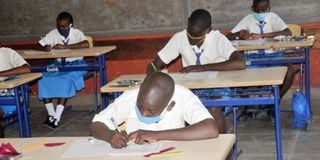Discard school exams that have now outlived their usefulness

KCPE candidates at Mikindani Primary School in Mobasa duirng an assessment test on October 21, 2020 after reporting back in school following outbreak of Covid-19.
What you need to know:
- Should education train us to just pass tests in school and interview sessions in companies or to function better in society?
- The trial examination which has just been administered only proves that the education system churns out answer-centric trainees.
I was surprised that anybody could be surprised by the unimpressive results of learners in the report released by the Kenya Global Partners in Education (GPE) Covid-19 Learning Continuity in Basic Education on Class 8 Learning Assessment.
The illuminating takeaway in it is that there has been mass failure after the school Covid-19 break.
The poor results should not surprise but serve notice to stakeholders on the big disconnect between schooling and its attendant usefulness. The report lends credence to the critique from some quarters that our education system has always been about teaching the test not for the sake of the learner's development.
The situation has always been with us but the rat race has made parents and guardians too blind and busy to see, and rendered the modern employer too keen a consumer for the top-tier graduates and not necessarily the most well-developed human resource. In fact, the proper question that should preoccupy our minds right now is: should education train us to just pass tests in school and interview sessions in companies or to function better in society?
Long recess
While some private schools threaten parents with dire consequences when the last shilling in fees has not been paid, nobody bothers about whether there is value for money up to the last shilling. I just received a show-cause letter from the school my son goes to. This is thanks to just a few shillings owed.
I am now required to believe that the long recess brought about by Covid-19 and poor Internet-based learning sessions in the intervening time are responsible for the loss of memory in learners.
This is not necessarily true. Nobody cares to explain and learn from the simple fact that no learner has forgotten the names of his or her classmates or teachers during the pandemic.
My son does very well on some of his homework assignments within 24 hours of doing similar ones in class, but does not know whether the assignments are going or coming after 72 hours. It stands to reason that the education system is rigged in such a way that instructions given are just intended to pass tests in the immediate short term. Rote learning.
Rote learning
The trial examination which has just been administered only proves that the education system churns out answer-centric trainees.
I sympathise with my son, for rote learning is not the only problem, there is the syllabus as well. A look at the English language course for Grade One befuddles, especially in the logic behind it; it is well above their level. A learner who has not been clearly told what a verb is is expected to identify verbs in a sentence. The sentences in question have both finite and infinite verbs.
Does a Grade One pupil know the difference between main verbs and other verbs? I have always thought, as linguist, that a better strategy would be limiting learning at this stage to just ‘naming words’ for nouns and ‘doing words’ for verbs and introducing the grammatical categories at later stages.
Overhaul syllabus
Perhaps it is time to overhaul the syllabus, CBC notwithstanding, and to eliminate all tests in schools to ensure question-centric trainees for education work better. It is asking questions in life that gives us innovations after innovations and innovators are more in their element when they are question-centric and not answer-centric.
With tests still on the table, looking from 8-4-4 to CBC and back to 8-4-4 again, I no longer see the difference. Tests have always been a selection and control tool meant to play to the scarcity mind set but may have outlived their usefulness with 100 percent transition from primary to secondary schools.
Last month may have been the most ideal time to toss them into the dustbin of artefact. I do not want to imagine, even for a minute, that we missed that opportunity.
The writer is a teacher at Nakuru High School




